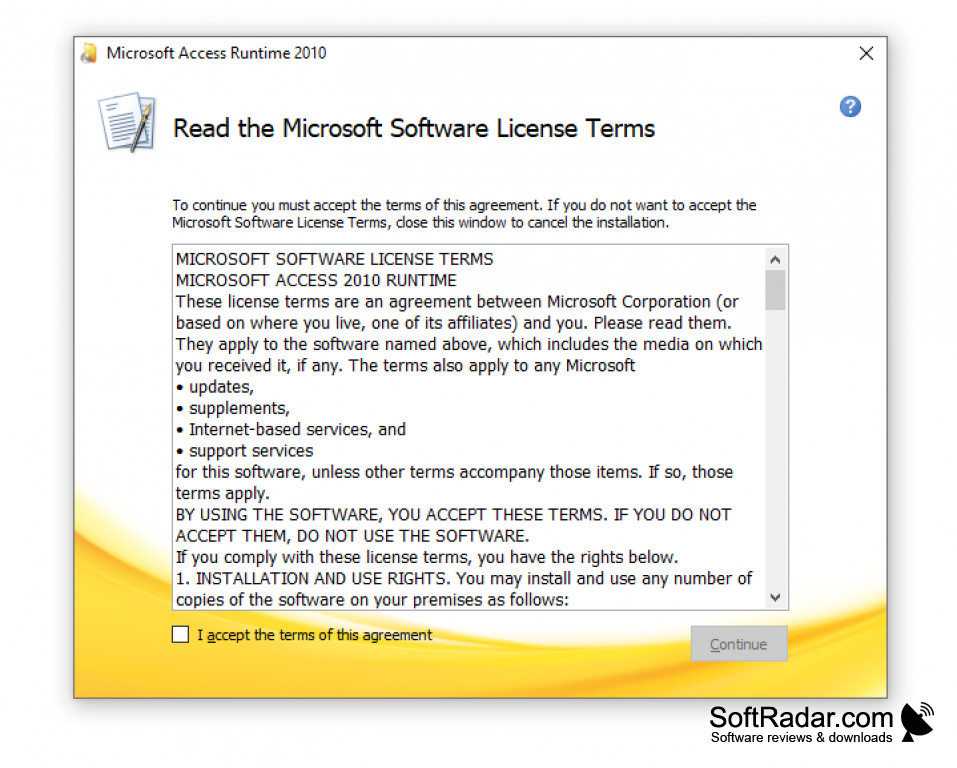
- #DISTRIBUTABLE ACCESS RUNTIME 2010 INSTALL#
- #DISTRIBUTABLE ACCESS RUNTIME 2010 UPDATE#
- #DISTRIBUTABLE ACCESS RUNTIME 2010 FULL#
- #DISTRIBUTABLE ACCESS RUNTIME 2010 CODE#
- #DISTRIBUTABLE ACCESS RUNTIME 2010 DOWNLOAD#
One way to separate data and logic is by using the Access Database command (on the Database Tools tab, in the Move Data group). This helps improve performance and reliability. In most cases, you should separate data management and application logic. For example, a user could cause data loss by unintentionally deleting or damaging the application file.

Combining data management and application logic in one file provides the simplest deployment method, but this method works best only if a few people use the application at the same time, and it involves some risk. This is the default application structure in Access. You can create an Access application that combines data management and application logic in one file. Should the data and the logic be separated?
#DISTRIBUTABLE ACCESS RUNTIME 2010 DOWNLOAD#
Understand and download the Access RuntimeĪCE no longer requires a separate installation to interact with non-Office appsīefore you begin, you should ask yourself the following questions about the way that the application will be deployed. This article discusses basic deployment planning, packaging and signing, deploying database applications, and the Access Runtime environment. A database application is a computer program that provides both a way to store and manage data and a user interface that follows the logic of business tasks (application logic). LessĪccess provides a feature-rich platform for developing database applications.
#DISTRIBUTABLE ACCESS RUNTIME 2010 UPDATE#
Update : I've updated the package to contain latest redistributable installers for Visual Studio 2015/2017/2019, as described on Microsoft's page The latest supported Visual C++ downloads.Access for Microsoft 365 Access 2021 Access 2019 Access 2016 Access 2013 Access 2010 Access 2007 More.
#DISTRIBUTABLE ACCESS RUNTIME 2010 FULL#
Update: I also prepared a full package with my script and "pirated" copy of all these installers for your convenience: Microsoft Visual C++ Redistributable Package.zip (77.3 MB). "2017\vc_redist.圆4.exe" /install /passive /norestart "2015 Update 3\vc_redist.圆4.exe" /install /passive /norestart "2015 Update 3\vc_" /install /passive /norestart "2013\vcredist_圆4.exe" /install /passive /norestart "2013\vcredist_x86.exe" /install /passive /norestart "2012 Update 4\vcredist_圆4.exe" /passive /norestart "2012 Update 4\vcredist_x86.exe" /passive /norestart "2010 SP1\vcredist_圆4.exe" /passive /norestart "2010 SP1\vcredist_x86.exe" /passive /norestart
#DISTRIBUTABLE ACCESS RUNTIME 2010 INSTALL#
To quickly install all of these libraries on the machines where lots of different applications are launched that may require them, I gathered all the libraries in one directory and I have written following BAT script: "2005 Updated\vcredist_x86.exe" /Q install /passive /norestart - passive (unattended) mode passive /norestart - passive (unattended) mode qb! - unattended mode with "Cancel" button disabled. qb - unattended mode, shows progress bar but no user interaction required. Visual Studio 2008: Just pass one of these parameters: Visual Studio 2005 (updated - the one I use): Unattended mode + disabled "Cancel" button is "/qb!". If you would like to install it in unattended mode (which will show a small progress bar but not require any user interaction), you can change the "/qn" switch above to "/qb". Vcredist_x86.exe /q:a /c:"VCREDI~3.EXE /q:a /c:""msiexec /i vcredist.msi /qn"" " Vcredist_圆4.exe /q:a /c:"VCREDI~2.EXE /q:a /c:""msiexec /i vcredist.msi /qn"" " Vcredist_x86.exe /q:a /c:"VCREDI~1.EXE /q:a /c:""msiexec /i vcredist.msi /qn"" Visual Studio 2005, x86 (32-bit version):

The question is: can you launch the installer of these packages with some special parameter so the user doesn't have to go through all the setup wizard, confirming each step? The answer is yes, but as Microsoft likes to change everything very often :) the exact command line is different depending on version.

The library is small and free, available to download from Microsoft website: Alternatively, you can distribute these DLL files (although I'm not sure if this is legal) or the whole library installer together with your application.
#DISTRIBUTABLE ACCESS RUNTIME 2010 CODE#
You can make your application not requiring this library by setting your project options in Configuration Properties > C/C++ > Code Generation > Runtime Library to "Multi-threaded " without the "DLL" part, which makes it statically linked. For example, version for Visual Studio 2013 (Release configuration) consists of files: msvcr120.dll, msvcp120.dll. Each version of Visual Studio has their own set. The functions of standard C/C++ library are implemented in a package of DLL-s called Microsoft Visual C++ Redistributable Package. You may think that unless you explicitly use some external library (like FMOD), your program will not require any additional libraries to work, but when coding in C++ using Visual Studio, this is not the case. I keep it for reference, but it probably doesn't reflect my current knowledge and beliefs. Warning! Some information on this page is older than 5 years now.


 0 kommentar(er)
0 kommentar(er)
